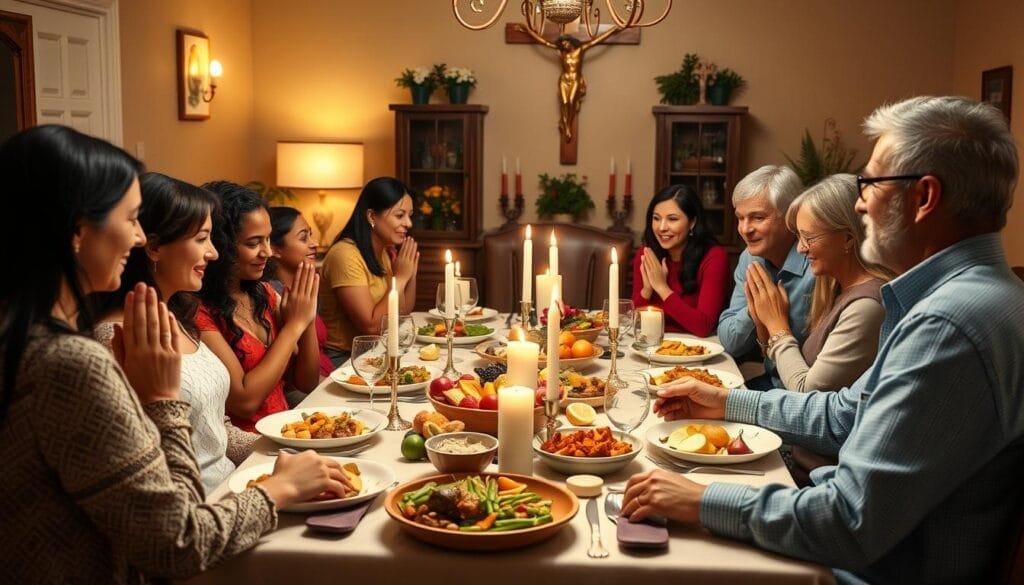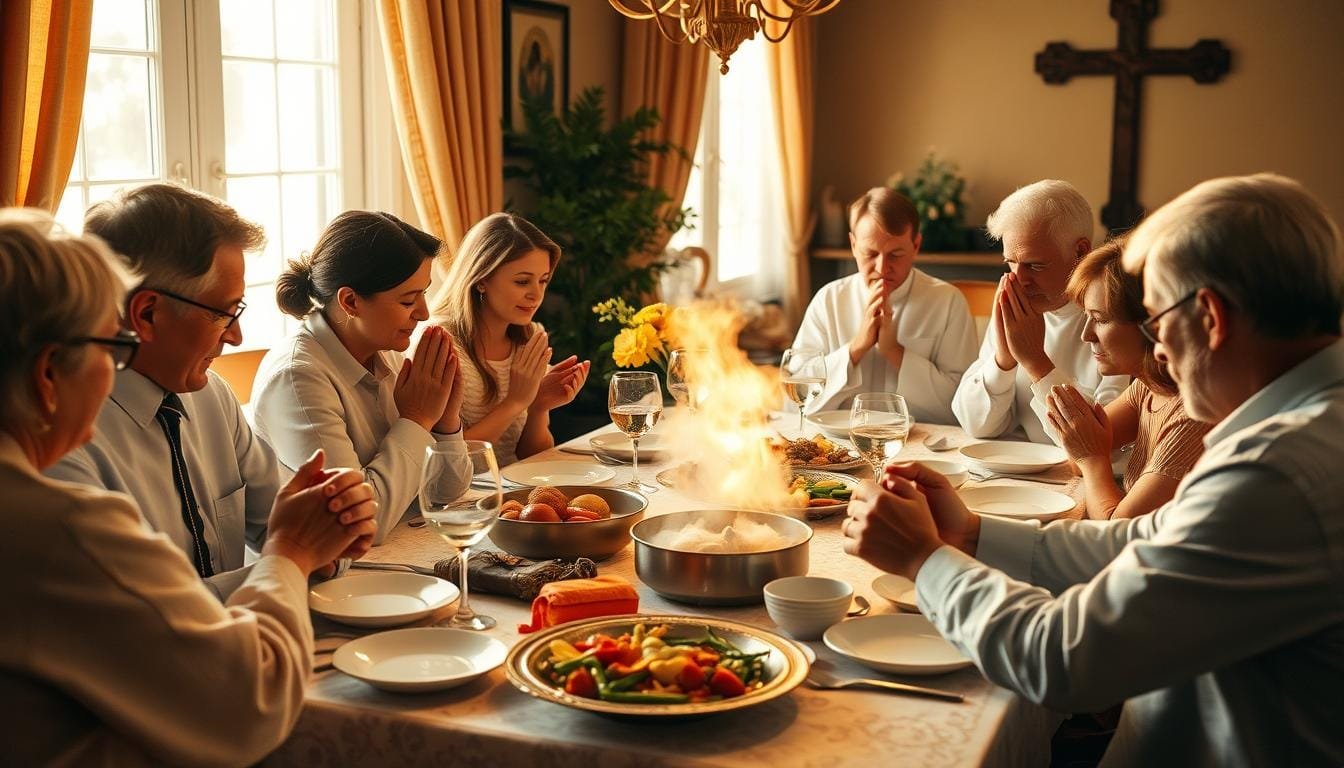Catholic Prayers Before Meals
This website contains affiliate links. As an Amazon Associate, I earn from qualifying purchases. The content on this website was created with the help of AI.
Catholics pause to pray before meals for a powerful reason. This tradition connects our daily lives with our faith. Let’s explore Catholic mealtime prayers and their impact on families.
Grace before meals is a cherished custom in Catholic homes across America. These food blessings offer a moment of reflection and gratitude.
They unite families and have been passed down through generations.
Catholic prayers before meals give us a chance to thank God for our food. They remind us of His providence and often-overlooked blessings. These moments of grace strengthen our faith and family bonds.
Key Takeaways
- Catholic mealtime prayers are essential for connecting faith with daily life
- Grace before meals expresses gratitude for God’s blessings
- Food blessings are rooted in biblical teachings and Catholic tradition
- Mealtime prayers foster family unity and spiritual growth
- Various prayer options exist for different occasions and family needs
Understanding the Significance of Mealtime Prayer in Catholic Tradition
Mealtime prayer is crucial in the Catholic tradition. It connects us to centuries of faith and practice. Jesus set an example for believers by blessing food before meals.
Historical Origins of Catholic Grace Before Meals
Praying over meals started before Jesus’ time. Ancient Jews offered thanks for their food. Early Christians, like Tertullian, saw mealtime prayer as worship.
Biblical Foundation for Food Blessings
Jesus blessed the food before feeding crowds. This act is key to Catholic mealtime prayer. It reminds us to be grateful for God’s provisions.
The Sacred Connection Between Food and Faith
Mealtime prayers link physical and spiritual nourishment. They mirror the Mass structure with praise, supplication, and gratitude. This practice keeps us connected to the Church’s daily prayer.
| Element of Mealtime Prayer | Significance |
|---|---|
| Supplication | Asking for God’s blessing |
| Gratitude | Thanking God for provisions |
| Praise | Glorifying God’s goodness |
| Dependence | Acknowledging reliance on God |
This Catholic tradition deepens our appreciation for God’s blessings. Mealtime prayers remind us of our faith daily. They foster thankfulness and reverence in our lives.
Catholic Prayers Before Meals Throughout the Liturgical Year
The Catholic calendar guides our spiritual journey with unique prayers for each liturgical season. These seasonal grace prayers link our daily meals to Catholic tradition.
They enrich our faith experience in meaningful ways.
Advent prayers focus on anticipation of Christ’s birth. Lenten’s grace emphasizes sacrifice and reflection. Easter brings joyful thanksgiving to our tables. Ordinary Time prayers help us grow in faith.
| Liturgical Season | Sample Grace Prayer |
|---|---|
| Advent | “Lord, as we await Your coming, bless this meal and our hearts.” |
| Christmas | “Jesus, born in Bethlehem, be present at our table and in our lives.” |
| Lent | “God of mercy, bless our simple meal as we reflect on Your sacrifice.” |
| Easter | “Risen Lord, fill us with joy as we share this feast in Your name.” |
| Ordinary Time | “Creator God, we thank You for this food and all Your daily blessings.” |
These prayers create a deeper connection between our faith and daily life. They keep us in tune with the Church year’s rhythms. This practice fosters gratitude and mindfulness at every meal.
Common Traditional Catholic Grace Prayers
Catholic families value saying grace before meals. These prayers link us to our faith. They remind us of God’s blessings in our lives.
Let’s explore some common prayers Catholics use. These express gratitude for daily bread.
The Standard “Bless Us, O Lord” Prayer
The most famous traditional grace prayer is “Bless Us, O Lord.” Kids often learn this simple yet powerful prayer first:
Bless us, O Lord, and these Thy gifts, which we are about to receive from Thy bounty. Through Christ our Lord. Amen.
Latin Grace Prayers and Their Translations
Latin blessings are special in the Catholic tradition. Here’s a common Latin grace prayer with its English translation:
| Latin | English |
|---|---|
| Benedic, Domine, nos et haec tua dona quae de tua largitate sumus sumpturi. | Bless us, O Lord, and these your gifts, which we are about to receive from your bounty. |
| Per Christum Dominum nostrum. | Through Christ our Lord. |
| Amen. | Amen. |
Short Mealtime Blessings for Busy Families
Quick Catholic mealtime prayers can help busy families. These brief blessings keep the spirit of gratitude alive:
- God is great, God is good. Let us thank Him for our food. Amen.
- Bless this food to our use and us to your service. Amen.
- For food and all your gifts, we thank you, O Lord. Amen.
Blessing our food connects us to God. It reminds us of His abundant love.
Choose traditional, Latin, or quick prayers. The act of blessing food is what matters most.
Teaching Children Catholic Mealtime Prayers
Family prayer habits flourish when kids learn mealtime prayers. We offer various methods to make grace fun and engaging for children.
Age-Appropriate Prayer Methods
Young kids enjoy simple hand gestures or picture-based prayers. Older children can lead grace or create their own prayers.
Our collection features 20 prayers, from traditional to modern, for teaching Catholic grace.
Making Prayer Time Interactive
Interactive grace keeps children focused during mealtime prayers. Here are some fun ideas to try:
- Use rhyming prayers (we have 31 examples!)
- Sing hymns together (15 kid-friendly options available)
- Recite scripture passages (10 recommended verses)

Building Family Prayer Traditions
Consistent family prayers create lasting memories. Try rotating prayer leaders or using special prayers for different days. Keep prayer simple and faith-focused.
We suggest three prayer statements to relieve pressure when kids are learning to pray. These approaches make Catholic mealtime prayers a cherished part of family life.
Special Occasion Meal Blessings
Catholic families treasure holiday prayers and festive blessings during celebrations. These special meal blessings deepen family gatherings and strengthen faith.
Our collection offers various Catholic feast day graces to enhance your holiday meals.
We’ve gathered 80 gratitude-focused quotes for Thanksgiving dinners. For Christmas and Easter, we provide unique blessings that reflect these holy days’ spirit.
Families can choose from diverse meal prayers to bless food and guests.
The Canadian Conference of Catholic Bishops offers structured holiday blessing formats. These guide those seeking traditional approaches.
We’ve also included various meal prayers by unknown authors for a personal touch.
| Occasion | Number of Blessings | Special Features |
|---|---|---|
| Thanksgiving | 80 | Gratitude-focused quotes |
| Christmas | 55 | Inspirational Bible verses |
| Easter | 30 | Resurrection-themed prayers |
| Saint Days | 25 | Prayers invoking specific saints |
Our festive blessings include verses from Psalm 136 and a dinner prayer hymn. These add a musical element to your mealtime rituals.
We’ve also included quotes from notable figures like President John F. Kennedy and Ralph Waldo Emerson.
Incorporating Catholic Prayers Before Meals into Daily Family Life
Catholic prayers at meals strengthen family bonds and deepen faith. A meaningful family prayer routine nurtures mealtime spirituality. It enhances Catholic household practices in daily life.
Creating a Sacred Mealtime Environment
Transform your dining area into a sacred space. Place a small statue of Mary or crucifix nearby. Light a candle before meals to symbolize Christ’s presence.

Developing Consistent Prayer Habits
Consistency is key in establishing a family prayer routine. Start with the “Bless us, O Lord” prayer. Gradually introduce new prayers, like the “Our Father” or short Latin graces.
Aim to pray before every meal, even quick snacks. This practice will reinforce the habit of prayer in your family.
Connecting Prayer with Gratitude
Use mealtime prayers to express gratitude. Ask family members to share one thing they’re thankful for. This practice enhances spirituality and fosters a positive outlook on life.
Incorporate these Catholic household practices into your daily routine:
- Recite the “Our Father” before meals
- Repeat “Lord, have mercy” three times during prayer
- Include “Christ God gives the blessing” in your prayer ritual
- Consider adding the Troparion in tone 8 for special occasions
Integrating prayer into family life can be simple. These practices create a rich tapestry of faith. They weave into your daily experiences, strengthening your family’s spiritual bond.
Modern Adaptations of Traditional Catholic Grace Prayers
Catholic families are updating their grace prayers to fit modern life. These new blessings blend tradition with relevance. They make mealtime prayer more meaningful for today’s believers.
Personalized mealtime prayers are becoming popular among Catholic families. These often include thanks for specific blessings.
Families express gratitude for a child’s school success or a parent’s new job.
Many families are creating their own prayer traditions. They mix traditional blessings with personal touches. This helps children connect with their faith and understand gratitude better.
“Our prayers evolve as our lives change, but the heart of gratitude remains the same.” – Catholic family therapist
Some new grace prayers address current issues. Families might pray for disaster victims or thank essential workers. This keeps them connected to their community and the world.
Catholics find ways to keep their faith’s essence while adapting prayers. They often use the Sign of the Cross or phrases from classic blessings. This creates a link between past and present.
Conclusion
Catholic prayers before meals have deep roots and lasting importance. These grace traditions nurture family faith and foster gratitude. They’re powerful tools for spiritual growth.
Mealtime prayers create a sacred pause in our hectic lives. They remind us of God’s presence and blessings. These prayers strengthen family bonds and deepen spiritual connections.
Grace traditions have adapted to modern family needs. They preserve their core essence while evolving. The act of giving thanks remains crucial in Catholic family life.
Simple or elaborate, these prayers build lasting memories. They nurture our faith journey together. Let’s cherish these moments of grace in our daily lives.










